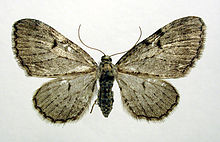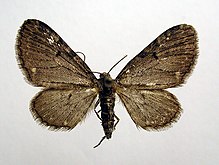| Eupithecia actaeata | |
|---|---|

| |

| |
| Scientific classification | |
| Domain: | Eukaryota |
| Kingdom: | Animalia |
| Phylum: | Arthropoda |
| Class: | Insecta |
| Order: | Lepidoptera |
| Family: | Geometridae |
| Genus: | Eupithecia |
| Species: | E. actaeata |
| Binomial name | |
| Eupithecia actaeata Walderdorff, 1869 | |
| Synonyms | |
| |
Eupithecia actaeata is a Eurasian species of moth of the family Geometridae.
Description
E. actaeata has a wingspan of 19–24 mm, with broader wings than is typical for Eupithecia species. Both wing pairs are grey, brownish-grey, or brown, with somewhat paler hind- than forewings.
Subspecies
- Eupithecia actaeata actaeata
- Eupithecia actaeata praenubilata Inoue, 1958
Distribution
Europe
Within Europe, E. actaeata is found France eastwards, where it is widely distributed in northern, central and eastern Europe, and has only local distribution south of the Alps.
Asia
In Asia, E. actaeata ranges from the southern Urals to Mongolia, China (Qinghai and Shaanxi), Japan, the Russian Far East, Taiwan and Korea.
Habitat and host plants
E. actaeata has been found at altitudes from sea level up to 2000m in Europe and between 1600 and 3000m in China. It is found in forests with a presence of Actaea spicata (baneberry), its main host plant. In north-western Europe, it is found predominantly in closed spruce forests. In Asia, it has been found on another species of Actaea. Other known host plants are Thalictrum aquilegiifolium and Thalictrum flavum. Viburnum opulus has also been mentioned in scientific literature, but might be erroneous.
Life cycle
| This section does not cite any sources. Please help improve this section by adding citations to reliable sources. Unsourced material may be challenged and removed. (May 2024) (Learn how and when to remove this message) |
There are two generations per year with adults on wing from the end of May to August. Larvae can be found from June to September. It overwinters as a pupa.
References
- Yu, Dicky Sick Ki. "Eupithecia actaeata Walderdorff 1869". Home of Ichneumonoidea. Taxapad. Archived from the original on March 25, 2016.
- ^ Mironov, Vladimir; Galsworthy, Anthony Charles (1 November 2013). The Eupithecia of China: A Revision. BRILL. pp. 232–233. ISBN 978-90-04-25453-4. Retrieved 22 January 2023.
- ^ Mironov, Vladimir (2003). Larentinae II: (Perizomini and Eupitheciini). Brill. pp. 174–175. ISBN 978-90-04-30863-3. Retrieved 22 January 2023.
- ^ Choi, Sei-Woong; Kim, Sung-Soo (30 April 2015). "New Records of Seven Eupithecia (Lepidoptera: Geometridae) from Korea". Animal Systematics, Evolution and Diversity. 31 (2): 132. doi:10.5635/ASED.2015.31.2.128. S2CID 86626630. Retrieved 22 January 2023.
- ^ Wagner, Wolfgang. "Eupithecia". European Lepidoptera and their ecology. Retrieved 22 January 2023.
- Mironov, Vladimir; Galsworthy, Anthony Charles (5 March 2014). "A survey of Eupithecia Curtis, 1825 (Lepidoptera, Geometridae, Larentiinae) in Mongolia with descriptions of two new species". Zootaxa. 3774 (2): 101–130. doi:10.11646/zootaxa.3774.2.1. PMID 24871410.
- Hydén, Nils (1990). "Baptria tibiale och Eupithecia actaeata (Lep., Geometridae) i Nordvästeuropa – utbredning, biologi, äggläggning och habitatval" [Baptria tibiale (Esper) and Eupithecia actaeata (Walderdorff) (Lep., Geometridae) in NW Europe – distribution, biology, oviposition and preferred habitats] (PDF). Entomologisk Tidskrift. 111 (1). Abstract.
- Ellis, W.N. "Eupithecia actaeata – Plant Parasites of Europe". bladmineerders.nl. Retrieved 22 January 2023.
External links
| Taxon identifiers | |
|---|---|
| Eupithecia actaeata |
|
This Eupithecia moth related article is a stub. You can help Misplaced Pages by expanding it. |